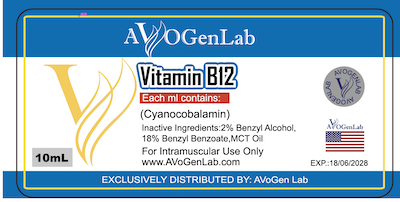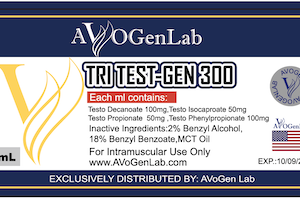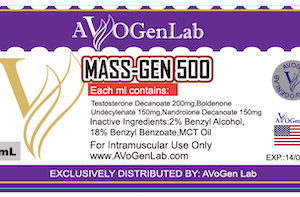Vitamin B-12
$25.00
In stock
| International Brand Name | Cyanocobalamin |
| Packing Strength | 1 x Vial 10ml/ 1000mcg/ ml |
| Manufacturer Name | AVoGen Lab |
Description
B-12 is an essential water-soluble vitamin that plays an important role in many functions in the body, including:
- DNA synthesis
- energy production
- nerve cell health
- red blood cell formation
- neurological function
B-12 is present in many food sources (mainly animal-based), where it is bound to the protein molecules in that food.
Vitamin B-12 is separated from the protein during digestion and is absorbed into the bloodstream.
Adequate stomach acid is required to release the vitamin from the protein, and a substance called intrinsic factor is necessary to ensure its absorption.
People who are unable to absorb vitamin B-12 properly may have pernicious anemia, which is a type of anemia characterized by a lack of intrinsic factor.
The average daily intake of vitamin B-12, as recommended by the Office of Dietary Supplements, is 2.4 micrograms (mcg) for men and women over 14. Pregnant and breastfeeding women require slightly more, at 2.6 mcg and 2.8 mcg, respectively.
B-12 shots: Synthetic vitamin B-12
In addition to getting B-12 from food sources, it is possible to acquire B-12 through a man-made version of the nutrient, known as cyanocobalamin.
Vitamin B-12 shots are injections containing high levels of cyanocobalamin. These shots, which can be self-administered or given by a doctor, can quickly boost B-12 levels in someone who is deficient.
Cyanocobalamin is available in liquid, tablet, or capsule form. Certain foods, such as cereals and non-dairy milk and yogurts, may be fortified with the man-made form of vitamin B-12.
While B-12 supplements and foods fortified with the vitamin are readily available, vitamin B-12 shots are only available by prescription, so a clinical diagnosis is always necessary.
It is important to note that low levels are rare in most healthy adults because the human liver stores several years’ worth of vitamin B-12.
However, some groups of people are more at risk of deficiency than others and may wish to discuss the possibility of B-12 shots with their doctor. These at-risk groups include:
People with signs and symptoms of B-12 deficiency
Anyone who is displaying any of the signs and symptoms of a B-12 deficiency or pernicious anemia should consult their doctor immediately.
Some common signs and symptoms include:
- decreased cognitive function, such as issues with memory or understanding
- fatigue
- lethargy
- constipation
- feeling faint
- depression or irritability
- headache
- difficulty maintaining balance
- sore, swollen tongue, which may be pale yellow or very red
- heart palpitations
- mouth ulcers
- paraesthesia (pins and needles)
- vision changes.
Benefits
There are several reasons to consider getting a B-12 shot, including:
Reduced risk of vitamin B-12 deficiency and associated complications
The most obvious benefit of receiving vitamin B-12 shots is treating a vitamin B-12 deficiency and avoiding its associated symptoms.
In addition, B-12 shots reduce the risk of some serious complications associated with vitamin B-12 deficiency including:
- heart disease
- neurocognitive disorders
- coordination problems (ataxia)
- peripheral neuropathy
- vision loss
- infertiliy (although this usually resolves with B-12 treatment)
- neural tube defects in the babies of women with B-12 deficiency
Additional information
| Packaging Strength |
|---|





